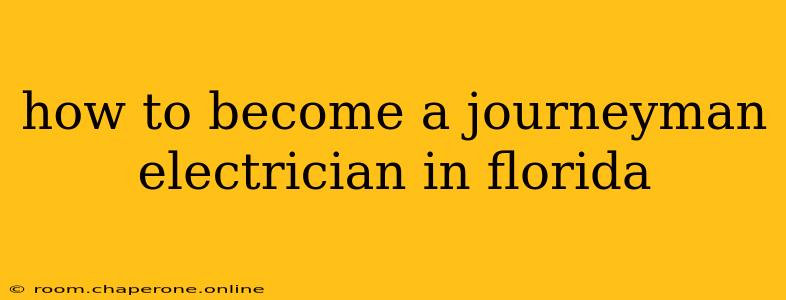Florida's thriving construction industry and robust electrical demands create a high demand for skilled electricians. Aspiring journeymen in the Sunshine State face a clear path, but it requires dedication, training, and adherence to specific regulations. This guide outlines the steps to becoming a licensed journeyman electrician in Florida.
Step 1: Meet the Educational Requirements
Florida's licensing process for electricians emphasizes practical experience and formal education. While there isn't a single prescribed educational path, the most common route involves a combination of:
-
Formal Apprenticeship: This is the most widely accepted route. Florida's apprenticeship programs are registered with the state and typically last four years. They combine classroom instruction with on-the-job training under the supervision of a licensed electrician. These programs comprehensively cover the National Electrical Code (NEC) and state-specific regulations. Finding a registered apprenticeship program is crucial, as it provides the necessary documented hours for licensing. Contact your local chapter of the International Brotherhood of Electrical Workers (IBEW) or the Florida Electrical Contractors' Association (FECA) to find registered programs.
-
Trade School/Vocational School: Completing a trade school program provides a solid foundation in electrical theory and practice. While it doesn't directly replace the apprenticeship hours required for licensure, it can be a valuable supplement and might expedite your apprenticeship process.
Step 2: Accumulate Required Hours
The cornerstone of Florida's electrician licensing is the required experience. You need to accumulate a minimum of 8,000 hours of documented on-the-job training under the direct supervision of a licensed electrician. This experience must be obtained through a registered apprenticeship program or in a similar structured setting that meets state requirements. Accurate record-keeping is paramount; maintain detailed logs of your hours, including dates, projects, and the supervising electrician's license number. Incomplete or inaccurate documentation can significantly delay your licensing application.
Step 3: Pass the State Examination
After completing your required hours, you must pass both a state-administered written exam and a practical exam. The written exam tests your knowledge of the NEC, Florida's electrical codes, and safety regulations. The practical exam assesses your hands-on skills and ability to perform various electrical tasks safely and efficiently. Thorough preparation is key; utilize practice exams and review materials to ensure you are well-versed in all relevant topics. You can find study resources and information on the exam from the Florida Department of Business and Professional Regulation (DBPR) website.
Step 4: Submit Your Application
Once you have successfully completed your education, training, and examinations, it's time to submit your application to the DBPR. This involves gathering all necessary documentation, including:
- Completed application forms: Downloadable from the DBPR website.
- Proof of apprenticeship completion (or equivalent experience): This includes your apprenticeship completion certificate and detailed work hour logs.
- Examination results: Your passing scores from both the written and practical exams.
- Fees: Pay the required application and licensing fees.
- Background check: You will undergo a background check as part of the licensing process.
Ensure all documentation is accurate and complete to prevent delays.
Step 5: Obtain Your License
Upon successful review of your application and background check, the DBPR will issue your journeyman electrician license. Remember, maintaining your license requires continued compliance with state regulations, including continuing education requirements.
Tips for Success
- Start Early: The process takes time. Begin planning and working toward your goal early.
- Network: Connect with other electricians, contractors, and industry professionals. Networking can provide valuable mentorship and job opportunities.
- Stay Updated: The NEC and Florida's electrical codes are regularly updated. Keep abreast of any changes to ensure compliance.
Becoming a journeyman electrician in Florida requires dedication and hard work, but the rewards—both personally and professionally—are significant. By following these steps and maintaining a commitment to excellence, you can achieve your goal and contribute to Florida's dynamic electrical landscape. Remember to always check the official Florida DBPR website for the most up-to-date information and requirements.

